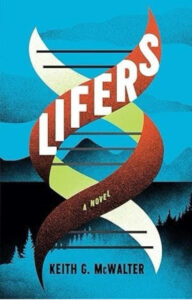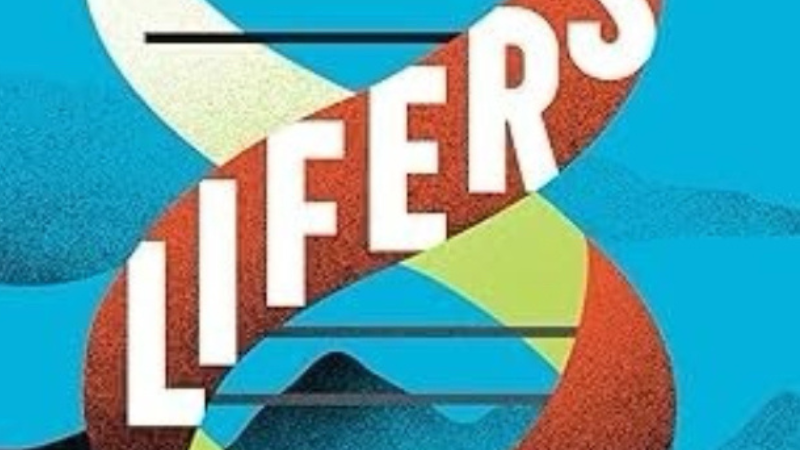 The oldest person alive today is 117 years of age. Which begs the question: in our lifetimes, what will a “lifetime” come to mean? Could there come a day when the boomers stop dying? When long-term care facilities fill to overflowing, funeral homes and cemeteries begin to close, and Social Security, having flirted with insolvency for decades, finally implodes? When there are half a billion super-centenarians worldwide who should be dead, but live on?
The oldest person alive today is 117 years of age. Which begs the question: in our lifetimes, what will a “lifetime” come to mean? Could there come a day when the boomers stop dying? When long-term care facilities fill to overflowing, funeral homes and cemeteries begin to close, and Social Security, having flirted with insolvency for decades, finally implodes? When there are half a billion super-centenarians worldwide who should be dead, but live on?
This is the world of Keith McWalter’s upcoming speculative novel, “Lifers” (October 15, 2024, SparkPress). With compelling action, exotic settings, provocative dialogue, and trenchant social commentary, it follows a multigenerational group of characters living through a global pandemic of radical longevity. Drawing on nonfiction accounts of advances in engineered longevity such as Chip Walter’s “Immortality, Inc.” and Andrew Steele’s “Ageless,” McWalter forgoes fabulism in favor of gripping plausibility and delivers genre-bending speculative fiction grounded in cutting-edge science.
The novel follows three extraordinary women — an ex-CIA microbiologist, a Washington insider turned advocate for “gray rights,” and a philosopher of death and dying — as they navigate violent ageism, the politics of scarcity, love rivalries, and dreams of a centenarian utopia in a transgenerational struggle to redefine what it means to be mortal. Neural nets, headchip communication, deathwish algorithms, full body tattoos, and slow suicide pills form the backdrop of a near-future world where humankind must decide: do I choose to die, or am I a Lifer?
“Lifers” is a deep, multifaceted dive into the unintended consequences of the quest for longevity, a searching interrogation of ageism, and a lyrical accounting of the cost of life without end.
“By the time Marion and Dan turned one hundred in 2049, there were over twenty million people their age or older in the US alone, and close to half a billion worldwide—the size of a major nation—who should have been dead by then but weren’t, who continued to haunt the world. And more coming up behind them, not dying either. Depending on one’s language, they began to be called Lingerers, or the Undead, or Lifers. Or worse things. Because they weren’t just a miracle; they were a crisis.”
– “Lifers” by Keith McWalter
“Lifers”
Keith McWalter | October 15, 2024 | SparkPress
Speculative/Social Science Fiction
Paperback | 9781684632763 | $17.95
Ebook | 9781684632770 | $12.99
Advance Praise for “Lifers”
“If Ann Patchett wrote sci-fi, this is what it might look like. What does it mean to live forever? To you? To your loved ones? To your country? To the world? A great read with a thought-provoking premise, and a sure-fire conversation starter for that dinner party you’re dreading.”
-Arlene Dillon, journalist and former President of the White House Correspondents’ Association
“Keith McWalter has turned in a stunner of a sci-fi novel with a surprising premise that draws on solid science while weaving a story loaded with twists and compelling characters. It’s a powerful combination that explores the unexpected directions ‘solving death’ may take us.”
-Chip Walter, author of “Immortality, Inc.” and “Doppelganger”
“A stimulating, timely exposition on the political, social and familial implications of a sudden advance towards longevity escape speed. A fascinating read!”
-Avi Loeb, bestselling author of “Extraterrestrial” and Director of Harvard’s Institute for Theory and Computation
 Keith McWalter’s first novel, When We Were All Still Alive, was published in 2021. His essays have appeared in The New York Times, The New York Times Magazine, and the San Francisco Chronicle. He’s the author of two blogs, Mortal Coil and Spoiled Guest, which present his essays and travel pieces to a loyal online following. A collection of his essays, No One Else Will Tell You: Letters from a Bi-Coastal Father, won a Writer’s Digest Award for nonfiction.
Keith McWalter’s first novel, When We Were All Still Alive, was published in 2021. His essays have appeared in The New York Times, The New York Times Magazine, and the San Francisco Chronicle. He’s the author of two blogs, Mortal Coil and Spoiled Guest, which present his essays and travel pieces to a loyal online following. A collection of his essays, No One Else Will Tell You: Letters from a Bi-Coastal Father, won a Writer’s Digest Award for nonfiction.
Keith is a graduate of Columbia Law School and earned a BA in English Literature from Denison University. He lives with his wife, Courtney, in Granville, Ohio, and Sanibel, Florida.
Find out more: https://keithmcwalterwrites.com/
Follow Keith McWalter on social media:
Facebook: @keith.mcwalter | Twitter: @kgmcwalter | Instagram: @kmcwalter
In an interview, Keith McWalter can discuss:
- What inspired him to write a novel about the negative implications of longevity.
- How longevity and the toll that age takes have become issues in our current political scene, with the advanced age and diminishing competence of the two main presidential candidates in the forefront of controversy.
- Why, in a novel about the sudden triumph of longevity science, death and mortality are central themes.
- How the author’s observations and personal experience of ageism informed the writing of this novel.
- The presence of strong female protagonists as the principal movers of the plot.
- How the book straddles genres: it might be called nonfiction fiction, or sci-fi for people who don’t read sci-fi, or political-social satire in speculative fiction drag.
- The ethical dilemmas of human life extension in a world of limited resources.
- The varied and sometimes exotic locations included in the plot (New York; Munich; San Francisco; Palo Alto; Napa Valley; Lake Garda (Italy); Santa Fe, NM; and the Rocky Mountains of Colorado), and to what extent the settings are drawn from real life.
- The concept in the book that self-sacrifice is expected of the elderly, both in our society, and in the fictional world where a “longevity plague” has taken hold.
An Interview with
Keith McWalter
What drew you to the ideas of prolonging the human lifespan and its impact on the meaning of living?
Like so many of us, I’m attracted to the idea of living a long and healthy life (I’m in my seventies), so I’ve read fairly widely in nonfiction accounts of longevity science and its practical applications.
Two things struck me about most discussions of longevity enhancement: increased longevity tends to be viewed as a luxury product for the rich and the few; and no one discusses the economic and social stresses that a radically longer (even if healthy) lifespan would impose on individuals, on families, and on society at large.
I wrote Lifers to dramatize those unspoken implications, and to examine ageism from a different perspective in which extreme longevity becomes commonplace and there are so many super-aged individuals that they become a force that must be reckoned with.
How do you envision society’s attitudes toward aging changing in a world with dramatically increased lifespans?
After a brief period of confused euphoria, society’s attitudes might quickly change to resentment, then to fear, then to anger.
Resentment, first, when it becomes clear that the wealth controlled by the aged is not going to be inherited by their children and grandchildren anytime soon – perhaps never – and that younger generations will continue to live in the older generations’ shadow.
Then fear, as it becomes clear that the “young” (called “doublers”in the book, for double-digits, or those under 100) face decades more life in a world where youth itself has lost its distinction – that is, its relative immunity to death.
Then, finally, anger, as the failure of the aged to die in the accustomed timeframe puts enormous strains on housing, social services, and national economies, and new political movements arise in an effort to impose “normative lifespans” and “common-good mortality.”
If there was one lesson or sentiment you would want readers to come away with after reading “Lifers,” what would it be?
The one sentiment that I hope would come out of a reading of this book is empathy. It’s really about the failure of empathy, both across age groups, and across socioeconomic lines. The young can’t imagine what it’s like to be old, and the old too often forget what it’s like to be young. The very fact that we use categorical terms like “old” and “young” is evidence of that failure. That’s the main function of the character Taubin in the book: he loves and learns so much from his grandparents, who raised him, and he’s a victim of progeria, or fast-aging, which forces him to experience what it’s like to be old when he’s still chronologically young. He’s also a precursor of the utopian state where everyone is the same age, and age itself becomes a meaningless concept. [I can expand on this.]
How has your writing evolved from your first novel to now? What are some key lessons you’ve learned along the way?
My first novel was decidedly “literary” in an old-school way, and I learned a great deal about characterization and dialogue in the process of writing and rewriting it. But it was deliberately episodic and plotless, like life, and I wanted this new book to be more plotted, more provocative, and a lot more fun. The main learning experience was about how to dole out complex information in a way that doesn’t talk down to the reader but also doesn’t overwhelm them. That, and work discipline: that first book took almost ten years of intermittent writing. This one took eighteen months of much greater focus.
Would you be a Lifer if you had the chance? Why or why not?
I’m glad to be able to say that I’d be a Lifer. I’ve had a wonderfully fortunate life and don’t think I’d ever give it up willingly, no matter how long I lived. I also hope I’d be so outraged by some of the backlash against the super-aged that’s depicted in the book that I’d be a Lifer in political terms, too – that I’d ally myself with Marion’s “Lifer Liberation Front” and agitate for change. If they’d have me.

A former award-winning journalist with national exposure, Marissa now oversees the day-to-day operation of the Books Forward author branding and book marketing firm, along with our indie publishing support sister company Books Fluent.
Born and bred in Louisiana, currently living in New Orleans, she has lived and developed a strong base for our company and authors in Chicago and Nashville. Her journalism work has appeared in USA Today, National Geographic and other major publications. She is now interviewed by media on best practices for book marketing.


